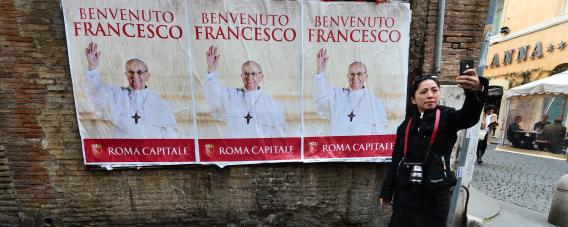Pope Francis has enjoyed a rather PR-friendly image since he was given the Catholic Church’s top job on Wednesday: He’s been lauded as a humble leader who lives a simple life (He rode the bus! He cooked his own dinner!), and is largely being given what amount to bonus points for having no obvious connections to the sex abuse scandals that have long plagued the church. (That bar isn’t as as low as one would hope.) But reporters who have searched the archives for potential dirt on the new pope haven’t come up completely empty.
Most notably, Francis faced allegations in 1986 and again in 2005 that he cooperated with the Argentinian Junta during the so called “dirty war” of the late 1970s and early 1980s, when the military dictatorship—in the name of imposing order—kidnapped, tortured, and killed leftist guerilla members or anyone flagged as sympathetic to them, often based on unsubstantiated evidence. In short, it was a brutal sociopolitical purge that “disappeared” as many as 30,000, and left an enduring mark on the Argentinian people. So how does Francis fit in? Mostly by staying quiet during the whole thing.
The allegations against him center around the kidnappings of two Jesuit priests in 1976 at the start of the war who were found drugged and seminude five months later in a field. At the time the two men were abducted, Francis—then Jorge Mario Bergoglio—was the superior of the Society of Jesus in the country, leaving him well-placed to condemn the kidnappings in specific and the war in general. Instead, he said nothing.
While Francis is now taking the heat for the church’s less-than-inspiring response to the human rights atrocities committed by the junta, it should be noted that he wasn’t the church’s worst public offender. Then-Archbishop of Buenos Aires Juan Carlos Aramburu was also silent on the human rights violations and even went as far as to deny the “disappearences” and common graves of the war. Bergoglio never went that far, but he didn’t publicly oppose the regime, either, and his well-known opposition to leftist liberation theology left him sharing a common enemy with the junta, suggesting to some that the Holy Father’s hands may not have been so clean.
Not all the evidence cited by critics is simple guilt by association, either, as The New Yorker explains (emphasis ours):
There have been past accusations, including testimony from a handful of priests and bishops, that the man who is now Pope Francis was complicit, too, if in a more subtle way. He was, in the early years of the Dirty War, the provincial, or superior, of the Society of Jesus in Argentina, at a time when the Jesuits produced some of the more freethinking and socially liberal clerics in Latin America—a number of whom were targeted by military leaders during the era’s repression—and later led a seminary. The key allegation against him is that he pointed out left-leaning priests to the military as dissidents, leaving them exposed, and that he did not defend two kidnapped clerics or ask for their release. He has denied this, and says instead that he protected priests and others—just quietly, in secret.
Of course, the allegations are just that, and there are plenty of people who remain unconvinced that Bergoglio did anything wrong. Here’s the Immanent Frame blog with a recap of the varying interpretations of the evidence against him:
An article written by Horacio Verbitsky, author of El Silencio (The Silence), in which Bergoglio is implicated with the junta, provides five testimonials, which, according to Verbitsky, confirm Bergoglio’s role. Defenders of Francis have included Nobel Peace Prize winner Perez Esquivel, who has vouched for Francis’s actions during the dictatorship, stating that while some members of the church were active with the junta, Francis was not one of them. An article for the Guardian takes a more neutral stance, calling the evidence “sketchy” and “contested,” while also referencing an apology that the church made in 2000, regarding its failure to take a stand against the military regime.
For its part the Vatican defended Francis today in the face of the renewed interest in the allegations. Here’s Vatican spokesman Federico Lombardi, quoted in Australia’s AAP:
“There has never been a credible, concrete accusation against him. The Argentinian justice system … has never charged him with anything… The accusations come from parts of the anti-clerical left to attack the Church and must be denied,” said Lombardi, insisting that Bergoglio “did a lot to protect people during the dictatorship” when he was not yet a bishop.
Francis has previously called the accusations that he was complicit in the junta “slanderous,” and one of the two kidnapped priests has since “reconciled” with Francis. Regardless of whether he bears an individual burden for his actions or lack thereof—or if that burden is mainly that of the Catholic Church as an institution—it seems that as pope he’s now in a position to address both. Of course, whether he does is another matter.
